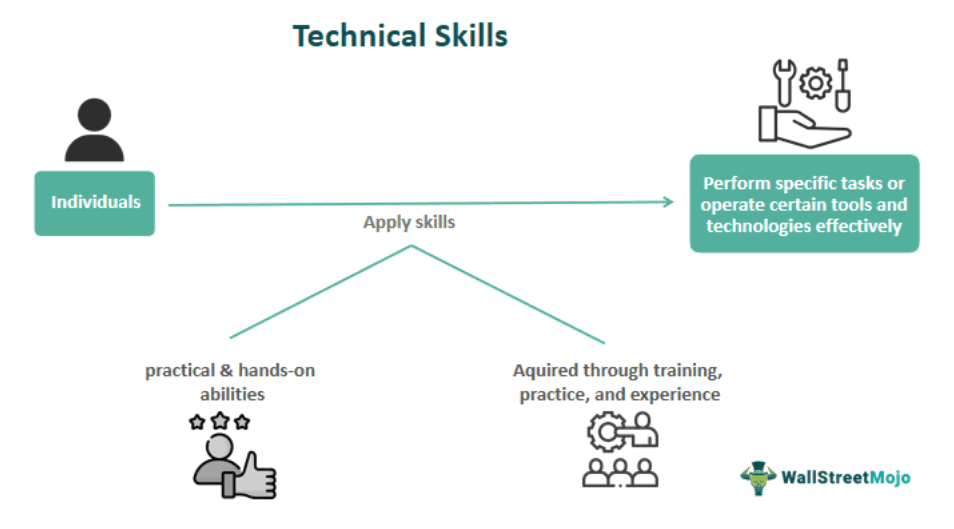Table Of Contents
What Are Technical Skills?
Technical skills refer to task-based knowledge required to perform actions and understand and control applications using various tools and programs. These skills are acquired through learning, education, and gaining experience by working on real-world problems and live projects.

In today's world, a diverse set of skills is essential for every task. Specifically, organizations seek individuals with a wide range of technical skills to work across different industries and fields. Virtually every entry-level position now demands a degree of accuracy and proficiency in technical skills, making them increasingly mandatory.
Key Takeaways
- Technical skills encompass knowledge and expertise acquired through learning and practical experience. They are vital for performing specific tasks and comprehending various tools and applications.
- In virtually every industry, with a particular emphasis on IT firms, a strong command of technical skills is highly sought after, and candidates are evaluated based on their proficiency in this area.
- While technical skills are crucial, a candidate's knowledge, expertise, and experience also play significant roles in the evaluation process. These factors are interconnected at different levels.
- Adequate technical skills can challenge a candidate and hinder a firm's growth and overall performance.
Technical Skills Explained
Technical skills encompass individuals' abilities to perform specific tasks, manage operations, and contribute effectively to the workplace. These abilities include the capacity to work with various tools, programs, and equipment gained through continuous learning and hands-on experience in problem-solving.
When applying for an entry-level position in any organization, candidates are expected to bring a wealth of technical knowledge, communication, and basic knowledge. This allows the company to deploy them in various roles, demonstrating their ability to operate across different departments.
The definition of technical skills emphasizes that the greater a person's technical knowledge, the higher their likelihood of finding employment and excelling. Proficiency in handling software and virtual tools and understanding technology are sought-after qualities in candidates for entry-level positions. Possessing more technical knowledge makes individuals more competitive and demonstrates their expertise and experience.
When organizations post job openings, they typically specify the technical knowledge they seek in candidates. However, several other factors are examined before selecting a candidate. In today's highly competitive job market, excelling in technical knowledge is crucial to increasing one's chances of being hired.
Examples
Let's look into some of the examples:
Example 1: AIOps
AIOps (Artificial Intelligence for IT Operations), a relatively recent term, pertains to the skills necessary for working with various AI tools and services. It involves managing connected systems that constitute a modern AI infrastructure to ensure uninterrupted service for end-users, which can be a business or its customers.
AIOps may also involve coordinating AI-as-a-service elements to construct an organization's AI infrastructure. Additionally, AIOps encompasses overseeing AI analytics in an organization's IT and data operations, potentially using machine learning and tech skills to optimize data utilization.
Example 2: Statistics And Probability
In technical skills, statistics and probability are traditional mathematical skills that remain fundamental for comprehending AI's workings and practical applications. Techniques like linear regression, logistic regression, clustering, Bayesian modeling, and random forest analysis predate the AI hype but underpin many advanced AI algorithms.
Understanding these principles is essential to grasp why computers are potent tools for automating decision-making in various organizations. A strong foundation in statistics and probability is invaluable when venturing into AI, as it aids in problem articulation and selecting suitable models and techniques for proposing solutions.
How To Improve?
Improving technical skills involves several methods:
- Allocate time for self-improvement by reading books and taking online courses. Continuous learning is crucial.
- Efficiency with tools and programs is important to enhance productivity and effectiveness.
- Keep abreast of emerging tools and systems, sharpening one's skills to gain a competitive edge.
- Continually practice and experiment within your work environment to refine one's skills.
- Learn from industry experts and others by actively listening to their experiences and advice.
- Broaden the horizons by exploring various skills and industries to gain in-depth knowledge.
- Take one's time to comprehend operations and tasks thoroughly rather than rushing through them.
Importance
Technical skills are of paramount importance for the following reasons:
- They are indispensable for carrying out tasks in a professional setting.
- Tech skills are relevant across all industries, fields, and sectors.
- Many jobs require certain tech skills; securing employment and performing can be challenging without them.
- Tech skills are highly valued, particularly in positions involving computers, software, and technological tools.
- Consistently working on tech skills enriches a person's abilities and knowledge.
- Tech skills are often essential for first-level managers overseeing operations and tasks effectively.
- Developing tech skills contributes to a stronger work profile and increased managerial authority.
Technical Skills vs Soft Skills vs Functional Skills
The main differences between the three are as follows:
| Technical Skills | Soft Skills | Functional Skills |
|---|---|---|
| Hard skills | Determine how a person approaches work | Combine multiple competencies |
| Operational and task-based | Focus on communication, interaction, and collaboration | Enable work in diverse settings |
| Specific, job-related skills | Generic skills that apply in various situations | practical and foundational skills |
| Example: Computer programming | Communication | Critical thinking, design & planning |
